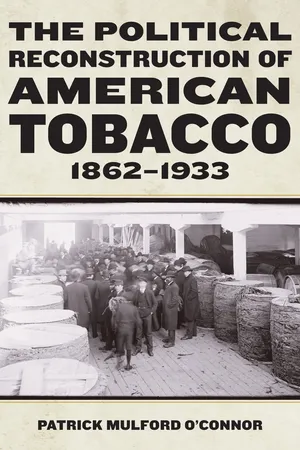
The Political Reconstruction of American Tobacco, 1862-1933
- English
- ePUB (mobile friendly)
- Available on iOS & Android
The Political Reconstruction of American Tobacco, 1862-1933
About this book
A deeply researched and clearly argued account of the mutual growth of the federal government and the modern tobacco
Nearly everything about the United States tobacco economy changed in the generation following the American Civil War. From labor to consumption, manufacturing to regulation, tobacco was utterly reconstructed, "comparatively a new industry," as one contemporary wrote.
The Political Reconstruction of American Tobacco, 1862–1933 exposes the causes of these changes, and in the process, it reconsiders cornerstones of the American national narrative. Through a detailed rendering of tobacco's late-nineteenth-century political economy, this book argues that the federal state's and American capitalism's development were mutually constitutive—and fundamentally political—processes. From the Civil War to the Progressive Era, diverse political movements across tobacco's commodity chain drove state and market development, creating the immense power and stifling poverty that defined tobacco's reconstruction. The Political Reconstruction of American Tobacco, 1862–1933 emphasizes the significance of the thousands of manufacturers whose interest groups shaped federal tax policy and, in turn, forged a powerful and effective internal revenue system; the increasingly influential fertilizer producers and warehouse operators who determined tobacco's value; and the crop scientists who sought to promote and rationalize US tobacco production. As these actors reshaped tobacco's commodity chain, they missed, and even dismissed, the interests of tobacco growers, especially newly emancipated African Americans and smallholding whites throughout the South.
The ruling logic of tobacco's reconstructed political economy rationalized agrarian indebtedness, justified low prices, and intensified labor discipline on thousands of small farms. In emphasizing these exclusions, The Political Reconstruction of American Tobacco, 1862–1933 reveals how nineteenth-century state and economic development coincided with and even created rural poverty.
Frequently asked questions
- Essential is ideal for learners and professionals who enjoy exploring a wide range of subjects. Access the Essential Library with 800,000+ trusted titles and best-sellers across business, personal growth, and the humanities. Includes unlimited reading time and Standard Read Aloud voice.
- Complete: Perfect for advanced learners and researchers needing full, unrestricted access. Unlock 1.4M+ books across hundreds of subjects, including academic and specialized titles. The Complete Plan also includes advanced features like Premium Read Aloud and Research Assistant.
Please note we cannot support devices running on iOS 13 and Android 7 or earlier. Learn more about using the app.
Information
Table of contents
- Cover
- Title Page
- Copyright
- Dedication
- Contents
- Introduction
- 1. “An Acknowledged Power in the Land”: Tobacconists, Taxation, and the Politics of Market Creation, 1862–1872
- 2. “A Hard Law at Best”: The Political Economy of Tobacco Taxation from Depression to Surplus, 1873–1890
- 3. Tobacco’s “Imperfect Knowledge”: Governance, Classification, and Conflict in the World Tobacco Market, 1865–1890
- 4. “The Road to Prosperity”: Power and the Politics of Quality on the Bright Tobacco Frontier, 1865–1900
- 5. The Health of the State: The USDA, Agricultural Hegemony, and the Federal Improvement of Tobacco Quality, 1890–1933
- Conclusion: Revising Tobacco Politics in the Twentieth Century
- Acknowledgments
- Notes
- Bibliography
- Index
- About the Author